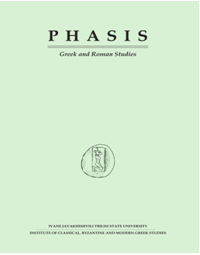Intellectual Characters in Homer’s Epic
DOI:
https://doi.org/10.60131/phasis.17.2014.2318Abstract
In modern scientific literature the theory of intellect by Howard Gardner – a Harvard University professor, is widely acknowledged. Howard Gardner admits that the intellect of the person may be defined according to the skills he owns. However, a skill is a person’s inherent (physical and mental) ability. The ability is given to a human being as a potential and further development of this ability depends on how the person will be given a chance to develop this skill (for instance, appropriate education, living conditions, requirements and so on). If a person acts properly or gets proper training, the inherent ability turns into a skill and if he does not learn or work in this field, this skill will not develop. The paper aims to define the intellectual level of the characters in the Homeric epic. They seem to have almost all the characteristics that are given in the theory of intellect by Howard Gardner: they are self-critical; they can admit their fault; they can give wise advice; they can take sensible advice into consideration; they never refuse to apologise; they make compromises; they have rich vocabulary; they can predict the results (that is why they make compromises); they are physically active; they are good leaders; they love team-work (fight), etc. Accordingly, they have all kinds of intellect: linguistic-humanitarian, logical-mathematical, visual-graphic, physical-kinesthetic, audio-musical, interpersonal and intrapersonal intellect. Their intellectual level is not lower than of what a modern educated person has. That means ancient education gave the same skills to people as the modern education provides.Downloads
Published
2014-05-17
Issue
Section
Articles
License
Copyright (c) 2014 PHASIS

This work is licensed under a Creative Commons Attribution-NonCommercial 4.0 International License.


